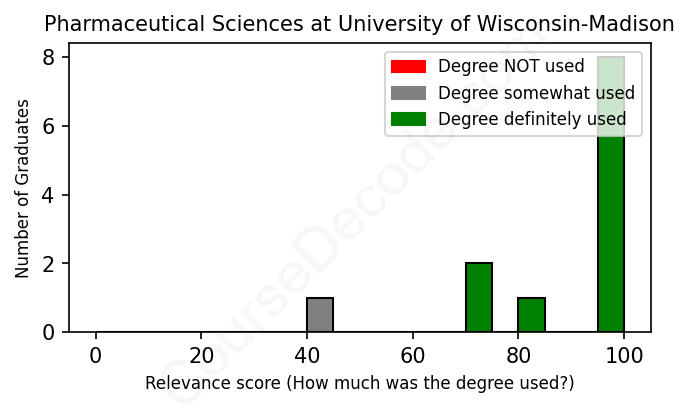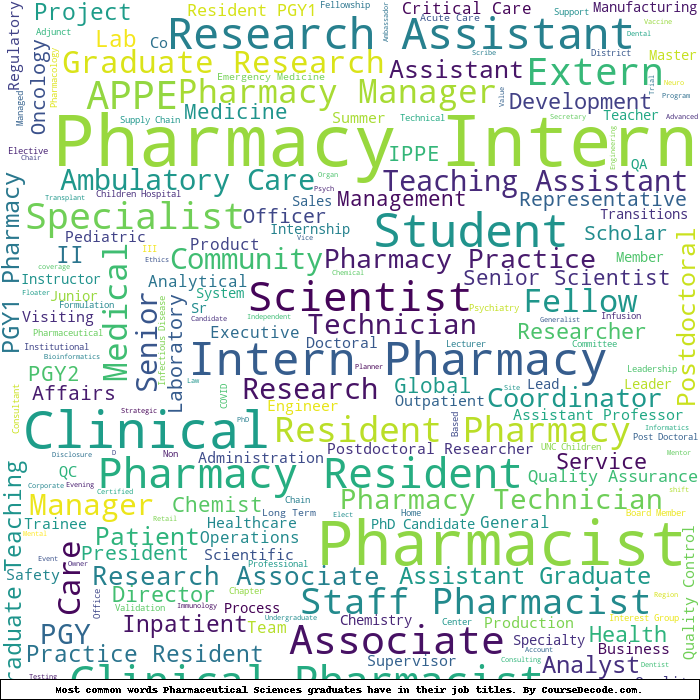
First, some facts. Of the Pharmaceutical Sciences graduates from University of Wisconsin-Madison we've analyzed , here's how many have used (or NOT used) their degree in their career:

These are estimates based on AI analysis of 12 LinkedIn profiles (see below).
The verdict? Great! Overall, with an average relevance score of 88%, Pharmaceutical Sciences graduates from University of Wisconsin-Madison have a substantially higher likelihood (+21%) of finding work in this field compared to the average graduate across all fields:
And for comparison, here's the chart for all profiles we've looked at across all degrees.
Also, after graduating, 91% of these graduates have pursued further education other than another Bachelor's degree (such as a Masters degree or other), compared to the average across all profiles of 35%. This suggests you may need more than just a Bachelors degree to be competitive as a Pharmaceutical Sciences graduate.
See the details:
|
Relevance score: 74% We think this person has gone into a career highly relevant to their degree. We think this person has gone into a career highly relevant to their degree.
DEGREE INFOGraduated in 2022 from University of Wisconsin-Madison with a Bachelor's degree in Pharmaceutical Sciences. Also pursued further education since (see below). JOB HISTORY SINCE GRADUATIONPharmacy Intern Walgreens May 2022 - Oct 2022 Pharmacy Intern  Select Medical Nov 2022 - Present Psych and Neuro Student Interest Group -- Vice President  University of Wisconsin-Madison School of Pharmacy May 2022 - May 2023 Psych and Neuro Student Interest Group --- President  University of Wisconsin-Madison School of Pharmacy Apr 2023 - Present FURTHER DEGREES DONE SINCE GRADUATINGDoctor of Pharmacy - PharmDUniversity of Wisconsin-Madison School of Pharmacy 2021 - 2025 ABOUTI am a driven, organized, and resilient third-year Student Pharmacist studying at the University of Wisconsin-Madison. After graduation, I am aiming to pursue residency programs.I have an interest in geriatrics in the hospital setting. I have seen first-hand the way that pharmacists are able to connect to patients in these settings through visiting my grandfather in the resident facility in the Zablocki VA. I am also generally interested in how dosing needs to be adjusted as our bodies begin to behave differently in old age.Outside of hospital pharmacy, I am also interested in independent retail pharmacies and how they differ from my Pharmacy Intern position at Walgreens. In an IPPE, I was able to observe a primarily long-term care independent pharmacy which was a unique experience. |
The top 10 most common jobs done by the graduates we've analyzed (ranked most common to least) are:
Based on the LinkedIn profiles of graduates from the University of Wisconsin-Madison with degrees in Pharmaceutical Sciences, it seems that many of them have secured jobs that are closely related to their field of study. The most common roles revolve around being a Staff Pharmacist, Pharmacy Intern, and Clinical Pharmacist. These positions require the application of extensive pharmaceutical knowledge, particularly in medication management and patient care, which is precisely what the Pharmaceutical Sciences program equips students for. Internships at pharmacies like Walgreens, CVS, and various healthcare settings are particularly noteworthy as they provide hands-on experiences that directly translate into relevant job skills.
Overall, the majority of these graduates seem to have successfully found employment that leverages their education in pharmaceutical sciences. While a few individuals have taken on roles that are a bit off the beaten path—such as web management or event coordinating—these are the exception rather than the rule. In general, most jobs listed are quite relevant to the field, which speaks to the value of a degree in Pharmaceutical Sciences from UW-Madison. If you're considering this field, it looks like there’s a solid pathway to putting that knowledge to good use in your career!
Here is a visual representation of the most common words in job titles for Pharmaceutical Sciences graduates (this is across all Pharmaceutical Sciences graduates we've analyzed, not just those who went to University of Wisconsin-Madison):

When you look at the career trajectories of graduates from the University of Wisconsin-Madison with a degree in Pharmaceutical Sciences, it’s pretty clear that many of them stick closely to careers in pharmacy and related fields. Right after graduation, a lot of these individuals start as pharmacy interns or in entry-level pharmacist positions, often working in well-known chains like Walgreens and CVS or getting experience in hospital settings. For example, many graduates are taking on roles that build up their clinical skills, such as working as pharmacy interns at major hospitals or in community pharmacies right after they finish their studies.
Fast forward 5 to 10 years later, and you see many of these graduates advancing through the ranks quite successfully. A significant number become licensed pharmacists, and many even move into specialized roles or managerial positions. Some have pursued residencies that lead to advanced clinical roles, like clinical pharmacists or pharmacy specialists in specialized care areas. Overall, it seems like these graduates are generally finding solid careers relevant to their degrees and making meaningful contributions in the pharmaceutical field, rather than spinning their wheels in unrelated jobs. So, if you’re considering this path, it looks like there are plenty of good opportunities waiting for you!
A Bachelor’s degree in Pharmaceutical Sciences, like the one at the University of Wisconsin-Madison, can be pretty challenging, but it really depends on your interests and strengths. You’ll dive into some tough subjects like chemistry, biology, and pharmacology, which can be heavy on the memorization and complex concepts—definitely not a walk in the park! However, if you're someone who enjoys science and is ready to put in the effort, it can also be super rewarding. Overall, I'd say it's on the harder side compared to more general degrees, but if you're passionate about the field, that passion can make it feel a lot easier!
Most commonly, in the LinkedIn profiles we've looked at, it takes people 4 years to finish a Bachelor degree in Pharmaceutical Sciences.
Alright, so looking at the job paths of these Pharmacy graduates from UW-Madison, it seems like they’ve been stepping into pretty solid financial territory. Most of them started off with internships, which is typical, but then moved into staff pharmacist roles, and from there, many advanced to managerial or specialized positions that usually come with good salaries. For instance, roles like “Senior Clinical Pharmacologist” and “Pharmacy Manager” generally pay pretty well, often exceeding six figures in many areas. Plus, even those who are still newer to the field, like the grads from 2022 and 2023, are already lining up internships in respected places or stepping into roles that will likely lead to decent paychecks. So, yeah, it looks like they’re on a path to making some good money in their careers!
Here is a visual representation of the most common words seen in the "about" section of LinkedIn profiles who have a Bachelor degree in Pharmaceutical Sciences (this is across all Pharmaceutical Sciences graduates we've analyzed, not just those who went to University of Wisconsin-Madison). This may or may not be useful:

Here are all colleges offering a Bachelor degree in Pharmaceutical Sciences (ordered by the average relevance score of their Pharmaceutical Sciences graduates, best to worst) where we have analyzed at least 10 of their graduates:
| College | Score | Count |
|---|---|---|
 The Ohio State University The Ohio State University
|
90 | 29 |
 UC Irvine UC Irvine
|
89 | 10 |
 University of Wisconsin-Madison University of Wisconsin-Madison
|
88 | 12 |
 University of Mississippi University of Mississippi
|
75 | 12 |